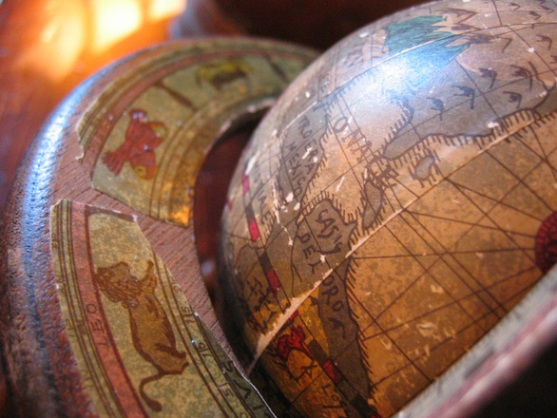Someplace in the World
Stories happen someplace in the world, but not just anyplace. Someplace special where I will take you. That’s the purpose of writing about specific locations and historical periods, and incorporating them into our stories. We writers take our readers to places they may never have been at times they couldn’t have traveled. Try to imagine Khaled Hosseini’s young runner, Hassan, chasing a blue kite down the sidewalks of Parkway Avenue in Trenton, NJ rather than across the snaggletoothed alleys of Kabul, Afghanistan before the revolution. Doesn’t have the same panache. Or consider Charles Dickens’ famished Oliver Twist begging for soup from the cafeteria lady at the school lunchroom instead of the miserly master of a workhouse in 1800’s London. Not nearly as desperate. Floating in a hot air balloon over Albuquerque is daily business compared to the heart stopping thrill of balloon racing around the world for 80 days at the imagination of Jules Verne. You can’t gallop the Pony Express in Manhattan or mush the Iditarod in the Everglades.
The places where our stories happen are as important as the characters peopling them and the events energizing them. When well realized, each complements the others and creates memorable images that propel the plot. More, the plot is possible because of specific locations. Even if you have never visited Kabul, Trenton, the Great Plains, Nome, or hitched a ride in a balloon gondola, you have a sense of the roiling sky above, the smell on the street, the sounds pummeling your ears, the motion that nearly makes you sick. Ignore location in your books and run the risk of readers dismissing your work. “Where in the world does this take place?” you can hear them ask, and if they do, you have failed.
How then, to include a genuine scene of the exotic or extinct in your story, to be in that place at that moment when you’re potatoing at your computer? My own stories have begun as much in a place as with a hero and a quest. They are lock stepped into a setting as distinctive and essential as The Great Wall is to China, into a period as horrific as the Inquisition is to fifteenth century Spain. The Inlaid Table was born in a shtetl in Poland between the two world wars and otherwise would have been a laminated TV tray. Where Did Mama Go? is as fastened to the current zeitgeist of Alzheimer’s discourse as cell phones are glued to teenagers. The Tree House Mother would only have been a description of a backyard fort were it not for the twisting narrow roads that confounded fire departments when Lemon Heights (Orange County, California) burned in the 1960’s.
Our house was only a few miles from the center of that inferno. I remember the billowing black smoke that rained ashes on the flatlands where we lived. If there is an authentic voice to the fire in my story, it’s because of a bit of luck forged years before. My parents were longtime friends with a married couple who lived in the hills. When the fire ignited, our family worried for everyone, but we knew who we worried for the most. Their friends were safe and their house remained intact, but many years later the woman proved an amazing source of first hand information. I recalled a lot about that week but I hadn’t been in the hills, only a hilltop from the flames. She had.
I phone interviewed Anita many hours over several days, then met with her in a restaurant where I sensed the anxiety she’d felt all those decades past. She told me things no one had reported, details that give flesh to a skeleton of an event. About the lost fire trucks, the panicked horses, the police coming around twice to warn people to evacuate, the manager who stood on the roof of the water department building and watched the fire leap ridge lines.
Then she brought out a packet of saved newspapers in a plastic sleeve, an entire journalistic rehash for two weeks of detailed reporting, and allowed me to take them home. Studying those papers was a boon I couldn’t have planned. Small town reporters know that a once in a lifetime opportunity to write up something other than high school football scores and lost dogs is to be mined for every ounce of fool’s gold and diamond dust, because it might be the only chance to move out of the minor leagues up to the real deal. The local newshounds honed their skills with attention to detail, fact collecting worthy of the FBI, and local color so neon that everyone knew exactly who’d been interviewed and which houses had burned. Thank you one and all, you young cubs, and I hope you went on to bylines and columns of your own.
I studied the papers, I re-wrote my notes, I pondered, and had plenty of true life detail to write into my otherwise fabricated story. My hero, a figment of my imagination, got sidelined by horses fleeing down the road. She gave directions to lost firemen. I know from personal experience the acrid scent of smoke, how hot are raging flames, but the frightened horses and lost firemen – that was the contribution of my friend, Anita. She doesn’t write stories but she remembered.
Do whatever you need to gather first person evidence. If you can’t interview Columbus or visit Timbuktu in order to write your story, scour diaries, census records, personal letters, almanacs, ship registers, train schedules, old maps, and warehouse supply lists. Snoop where snooping will unearth something useful, even though you won’t know how useful till you’re writing. Get those facts and thread them into your story so your reader will smack his hand against his head and declare, “Feels like I’m right in the middle of this.”


